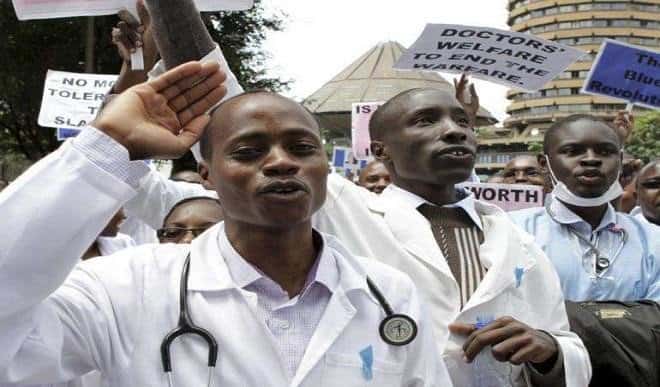NARD STRIKE AND BEYOND: HOW RESIDENT DOCTORS CAN WIN DEMANDS
MSA Reporters

The National Association of Resident Doctors (NARD), an association of medical practitioners learning and working in teaching hospitals, embarked on an indefinite strike on 1st April 2021. The demands of the strike include pay increase, payment of hazard allowances and improvement in living and working conditions of the doctors.
The commencement of the strike against the background of the foreign medical trip of President Muhammadu Buhari to London in the United Kingdom further exposed the insensitivity of the regime to the rotten state of the health sector. There is no gainsaying the fact that Nigeria’s health sector is in a dilapidated state. Apart from the fact that thousands of Resident Doctors are being owed as much as six months’ pay, frontline health workers, including Doctors in the fight against COVID-19, are only offered N5,000 ($13) as hazard allowances. The Resident Doctors are also protesting the lack of life insurance coverage and review of the law regulating the Postgraduate Medical Training (PMT) in Nigeria.
The indices of Nigeria’s health sector are despicable. Nigeria has only 3.8 doctors per 10,000 people, which means 0.38 Doctors per 1,000 people. According to Global Goals’ recommendation, a series of targets set by the United Nations in 2015, countries should aim for a minimum of 1 Doctor per 1,000 people. In other words, Nigeria would need at least 200,000 Doctors to sufficiently cater for its 200 million people.
Added to this nightmarish situation is the severe underfunding of the health sector. Successive regimes have consistently allocated less than 10% of their budgets to healthcare despite a 2001 declaration by African Heads of State – known as the Abuja Declaration – to allocate 15% of their national budgets to healthcare. Only 3.7% of Nigeria’s 2021 Budget is allocated for healthcare.
NARD suspended its indefinite strike action on 10th April, 2021 for 4 weeks after 9 days of strike action based on a new agreement reached with the Federal Government. Government has a bad reputation for not honouring past agreements and the Doctors vowed to resume the strike, if, after 4 weeks, there is no concrete implementation of the new agreement.
Less than two weeks into signing the new agreement, the Federal Government scrapped payment of salaries of medical house officers, Resident Doctors and other health interns including dental house officers, nurse interns, pharmacist interns, medical laboratory interns and NYSC Doctors. NARD has condemned the action and has warned that this brutish action of government will affect the frail industrial peace in the health sector.
Resident Doctors are likely to return to the trenches of strike action in the coming period. For Resident Doctors to win the demands of their struggle, they will need the solidarity and support of their mother association, the Nigerian Medical Association (NMA) and other non-medical trade unions organized in the Joint Health Staff Unions of Nigeria (JOHESU).
Issues of pay disparity have divided JOHESU on one hand and NMA/NARD on the other hand. This has had a counter-productive effect on the struggles of the health workers’ unions. Issues such as increase of hazard allowance affect all layers of health workers, including medical doctors in both NARD and NMA, nurses in the National Association of Nurses and Midwives (NANM) as well as non-medical workers organized in JOHESU. It is only by abandoning every form of division and rivalry and embracing joint action that health workers can win better pay and working conditions.
Going forward, the labour centres, NLC and TUC need to bring the weight of the labour movement to bear on the struggle for redemption of the health sector. The NLC and TUC need to help to forge the unity of the workers in struggle. The failure of the entire ruling elite to finance qualitative healthcare, that is accessible to all, raises the necessity of building a working people’s political alternative. The central labour leaderships must not shy from this task.
